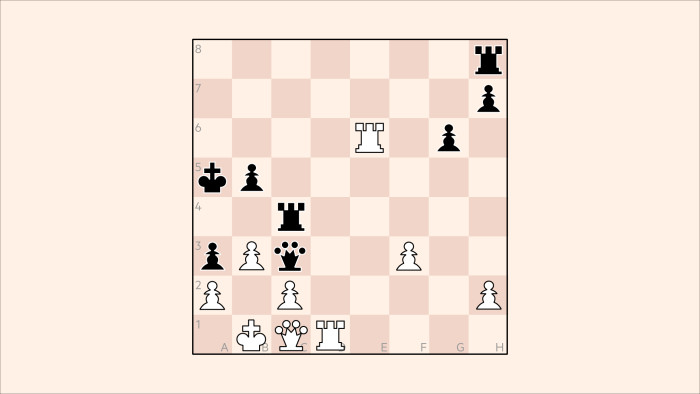Chess: England over-50s bid for world gold, while seven-year-old duo eye records

The Candidates is under way this week, as eight elite players try to qualify as Magnus Carlsen’s next challenger. The 2021 challenger Ian Nepomniachtchi is the early leader with 3/4, but it is still early days in Madrid, where the contest continues until July 4.
Meanwhile, England over-50s have a golden chance in the world senior teams which began on Monday at Acqui Terme, Italy. The No1 seeds are led by Michael Adams and Nigel Short, supported by the experienced trio of Mark Hebden, John Emms and Keith Arkell. Hebden, who recently became English champion at age 64, scored a rapid round one win against a Norwegian amateur, who erred fatally at move 14.
Mark Hebden v Anders Hoyer Berg, Queen’s Gambit Accepted
1 d4 d5 2 Nf3 Nf6 3 c4 dxc4 4 e3 e6 5 Bxc4 c5 6 O-O a6 7 Bb3 Be7 8 Qe2 cxd4 9 Rd1 Nc6 10 Nc3 O-O 11 Nxd4 Qc7 12 Bd2 b5 13 Nxc6 Qxc6 14 Rac1 Ra7? (Bc5!) 15 Nd5 Qd7 16 Nxf6+ gxf6 17 Bc3 Qe8 18 Qg4+ Kh8 19 Qh4 Rg8 20 Bxf6+ Bxf6 21 Qxf6+ 1-0
England’s main rivals are the US, fielding a team of former Russians. The No3 seeds Georgia include the renowned Nona Gaprindashvili, now 81. English medals look probable, but their colour may be decided by the head to head against the US.
England over-65s, headed by John Nunn, are second seeds behind Israel, whose lower boards are strong. Game viewing on livechess24.com is limited to the top two matches in each event, although that is likely to feature at least one English team on most days. Play starts 2pm BST daily and continues until June 29, with a rest day on Saturday.
At the other end of the age scale, English junior chess currently has two exceptional seven year olds. Kushal Jakhria and Bodhana Sivanandan won five golds between them at last month’s European Schools and World age group championships in Rhodes, where England jumped to second behind Ukraine in the medals table.
Jakhria recently shared first in competitive adult Majors at Blackpool and Newmarket, and is in contention to become the youngest English player ever to reach a 2000 rating, that is 175 in old-style grades and a level which the US recognises with its Expert title.
Sivandandan won all her 24 games at Rhodes, including a must-win final round against a Swiss rival. Most of her successes have been in junior events, until last weekend when she took on London experts in the Golders Green and Kensington one-day Opens.
The result was eye-catching. Sivanandan’s combined total of 6.5/12 included two wins over 2000+ adult opponents and a shared rating prize. Her overall rating performance of around ECF 1955 was, by a distance, the best ever for an English girl of her age, eclipsing the early achievements of the 1930s prodigy Elaine Saunders and of England’s current No 1 Jovanka Houska.
In terms of historic and global comparisons, it would probably only have been surpassed at age seven by Hungary’s legendary Polgár sisters, by China’s all-time No 2 Hou Yifan, and by a handful of Russian girls.
Sivanandan, who learnt chess just 18 months ago, is a pupil at a state primary school in Harrow. Last Christmas, at six, she was the only English junior ready to travel to Serbia for the European under-8 rapid and blitz, and came away with two silvers. Her skills have developed with help from a local coach, chess videos, the ECF Academy, online tournaments, and her ambitious approach to competition.
The ECF arranged daily training for Jakhria and Sivanandan in Rhodes via Skype from the twice British champion Jonathan Hawkins, but this stopped at the end of the competition.
Exceptional players during the English Chess Explosion decades half a century ago could look to patrons or sponsors like Jim Slater who gave awards for England’s first grandmasters, Lloyds Bank which helped fund the best juniors of the 1980s, and others who backed the promise of Luke McShane and David Howell. It is now more than 20 years since Howell emerged, so it should be time for another mega talent-or two — but will they find support?
Puzzle 2474
Elisabeth Paehtz v Mahri Geldiyeva, Baku 2016. White to move and force checkmate. Germany’s best woman player (White, to move) has the black king trapped on the board edge. How did White finish the game in style?
Click here for solution
Comments